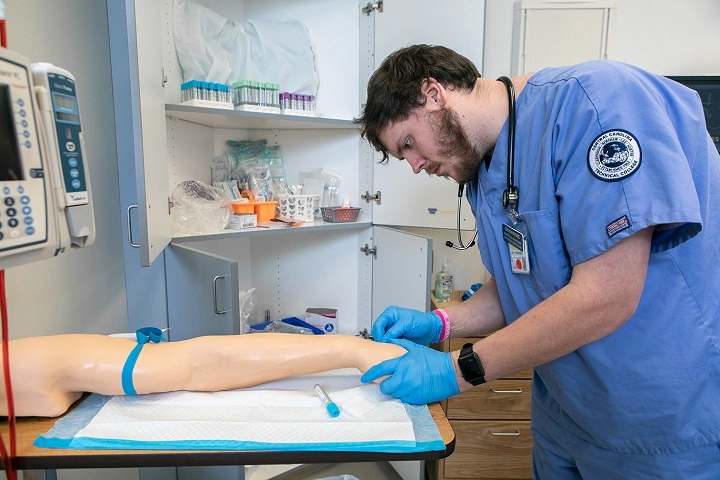Nursing is a respectable and needed profession across the globe. Hospitals, clinics, and nursing homes depend on nurses. As they attend to patients on a daily basis. If you’re interested in being a nurse but don’t feel like attending school for four years right away. Then an ADN program might be the most practical solution for you.
ADN is an Associate Degree in Nursing. ADN is a degree that educates students into potential registered nurses (RNs) in shorter time than a bachelor’s degree. ADN degrees are very highly desired by people who are willing to begin the career in nursing at an early stage, pay lower tuition fees, and get employed early.
This blog will cover what ADN nursing programs are, what you learn, how long they are, pros and cons, and what kind of career you can enter when you graduate.
What is an ADN Nursing Program?
An ADN program is a two- or three-year college program of study. The students are awarded an Associate Degree in Nursing upon completion of studies. After graduation, they must pass and sit for the NCLEX-RN examination to be licensed as a registered nurse to practice.
ADN courses typically have a presence at universities and community colleges. ADN courses entail learning through hospital or clinic practice and classroom lectures. It is not a question of studying books about nursing but having your hands dirty on patients.
What You Learn in an ADN Program

There are also courses in an ADN program that you learn to study science and patient care techniques. Some of the courses they have in common are:
- Anatomy and Physiology: Learning about the functioning body
- Microbiology: Learning about germs and disease
- Pharmacology: Learning about medicine and medication effects on patients
- Nursing Fundamentals: Basic nursing care
- Medical-Surgical Nursing: Medical-surgical nursing care to acute patients
- Pediatric Nursing: Children’s care
- Maternal and Newborn Nursing: Mother and baby care
- Mental Health Nursing: Caring for emotionally or mentally ill patients
Aside from classroom studies, the students also get to work hundreds of hours on clinical rotations. By clinical rotations, you work in hospitals or clinics under practice supervision by experienced teachers and nurses. This is to make you more assertive and practice actual nursing skills.
How Long Does It Take to Complete an ADN Program?
Most of the ADN programs will take two years if you are taking it full-time. Others will take a bit more time if you are taking it part-time or if you have to take prerequisites first before you can enter.
You might be able to take the course in fewer years if you already have some college credits. Or, if you are working and attending school or if you have family commitments, it’ll be three years.
Why Pursue an ADN Program?
There are numerous reasons why people opt for ADN programs over other nursing programs.
- Less Time: You can finish in approximately two years, while it takes four years to earn a bachelor’s degree.
- Less Cost: ADN programs are cheaper, especially if you attend a community college.
- Earlier Nursing Career: You can start your nursing career earlier.
- Better Remuneration: ADN graduates are usually remunerated with a fair salary and are well-established in professional life.
- Fond Career Progression: After working as an RN, you can come back later for a Bachelor of Science in Nursing (BSN) if you want to advance your professional life.
Cons with ADN Nursing Programs
Despite the usefulness of ADN programs, they too are not immune to problems.
- Competitive Admission: Many students are willing to be accepted into ADN programs, and therefore waiting lists occur.
- Heavy Workload: Nursing programs involve much study, long study hours, and practice in the hospital.
- Limited Progress: There are various hospitals that would desire to hire nurses with a BSN degree, especially for their managerial ranks.
- Continuing Education: You may have to return to school someday in order to obtain a BSN if you require more career options.
In spite of all these hurdles, the majority of nurses start with an ADN and end up having successful and long careers.
The NCLEX-RN Exam
After graduating from an ADN program, you will be required to sit for the NCLEX-RN exam in order to become a licensed nurse. The exam contains everything that you learn in school, including patient care, safety, health promotion, and medication.
When you sit for the exam and pass, you are qualified to practice as a nurse. ADN programs equip you to sit for the exam through practice exams and study sessions.
Career Opportunities with an ADN

With an ADN and RN certification, you are eligible to work in different other healthcare organizations such as:
- Hospitals
- Clinics
- Nursing homes
- Home healthcare
- Schools
- Community health centers
Some of the job titles which are quite common include:
- Hospital Staff Nurse
- Pediatric Nurse
- Medical-Surgical Nurse
- Geriatric Nurse (working with the elderly)
- Home Health Nurse
Nurses are in high demand, and ADN graduates can find easy job placement.
Also Read: OBGYN Charlotte NC: The Women’s Health Timeless Champions
Salary Expectations
ADN nurse salaries depend on where you work and how much experience you have. United States registered nurses generally earn between $65,000 and $85,000 per year. You can earn more in some states or hospitals.
Although the BSN nurses will sometimes earn a little more, the ADN nurses actually prosper and have great job security.
ADN vs. BSN: What’s the Difference?
The ADN and BSN graduates can both be registered nurses, but there are a few distinctions.
- ADN: 2 years, cheaper, faster to become a nurse, less since it does not provide as much career development.
- BSN: 4 years, more expensive, more opportunity for leadership, research, and higher levels.
Most hospitals today are paying ADN nurses to go back to school afterwards and pursue an RN-to-BSN degree. They are typically online and take 1–2 years part-time while working.
Is an ADN Program Right for You?
You may be a good fit for an ADN program if:
- You want to become hired as a nurse sooner
- You require an inexpensive transition into nursing
- Are capable of working extended hours and have a busy schedule
- Are going to possibly return to school later in life for a BSN
If your goal is to get into nursing in as short of a timeframe as possible, an ADN program is a suitable choice.
The Future of ADN Nurses
There is always a debate on whether BSN or ADN would become the standard for nurses. Some hospitals currently demand graduates in BSN, but there still exists a presence of ADN nurses. ADN nurses need to provide healthcare needs in a lot of the country, especially rural towns or small towns.
The future will see ADN nurses completing their BSN at the end of their careers, although the ADN pathway will continue as an assured entry into the profession.
Conclusion
ADN schools of nursing are one of the fastest and most affordable ways of becoming an RN. After two years, you can become a practicing nurse in hospitals, clinics, or care communities.
These degrees give classroom training and actual clinical exposure. There are cons in the form of challenging courses and no room for advancement unless you possess a BSN, but the benefits are totally worthwhile. You can earn a good amount of money, have a secure job, and most importantly, work with people on a daily basis.
If the dream career is that of a nurse, perhaps an ADN program is the best place to start. It can be the ticket into a career of importance, development, and influence in the lives of people.


